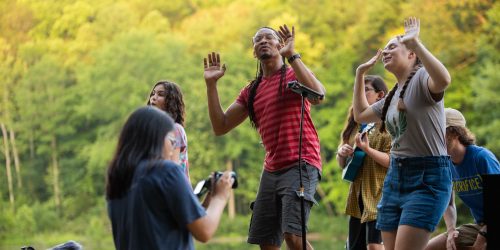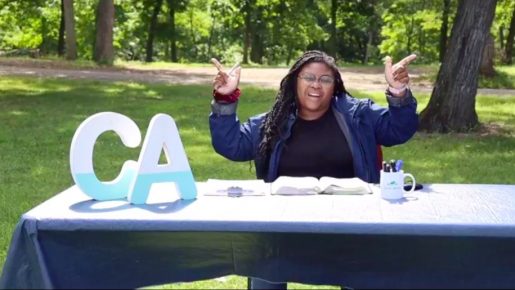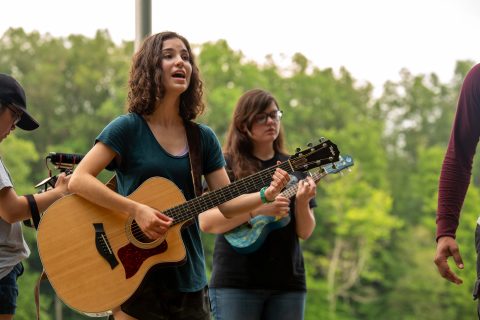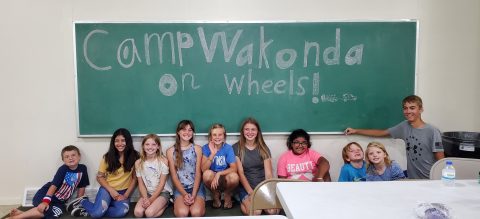
This year, summer camps across the Lake Union were very different. Pictured here, Indiana camp staff have fun during a taping for their virtual program. | Photo credit: Joshua Pedroza
The sounds of fun and laughter echo across the campus as summer camp staff and campers go about their daily activities. But what once used to be a place full of laughter and fun camp songs has fallen eerily silent.
Like many other events and activities, most summer camps have not been able to escape the effects of the pandemic. As the novel coronavirus became a pandemic earlier this year, many Adventist summer camps held out for as long as they could before making the dreaded decision; that there would be no traditional summer camp this year.
However, instead of forfeiting their summer altogether and losing an opportunity to mentor the youth in their communities, many camps began planning creative ways to host virtual or mobile camp programs. “Summer youth ministry is too important to quit,” says Lake Union Youth Director, Ron Whitehead. “So, we adapt. All for His glory.”
Importance of Summer Camp
The very first summer camp in the North American Division was held in 1926 in Townline Lake, Michigan. Wisconsin opened one the following year, in 1927, Illinois in 1928, and then soon thereafter other conferences followed their example.
The Lake Union Conference is now home to six Adventist camps: Camp Akita in Illinois, Timber Ridge Camp in Indiana, Camp Wager in the Lake Region, Camp Au Sable and Camp Sagola in Michigan and Camp Wakonda in Wisconsin.
Since those early days, camping ministry in the Lake Union has grown exponentially and served as an important venue for youth evangelism. “Some people believe camp ministry is only about fun and games but in the Lake Union camp ministry is first about calling people to Jesus and then fun and games,” remarks Whitehead. “Every summer hundreds to thousands of youth and adults rededicate or give their lives to Jesus for the first time at our camps.”
In fact, last year more than 2,300 campers attended a summer camp in the Lake Union, plus more than 1,200 attended family camp. Of that number, more than 1,900 decisions were made for Christ and over 600 requested baptism.
This year it came as no surprise that many camps were forced to cancel their summer programs. And, perhaps this was the first time they were forced to do so. Youth leaders watched as state regulations allowing only small groups to congregate during the pandemic forced them to rethink their plans. The idea of virtual summer camp seemed like an anathema. Afterall, one big incentive for parents to send their kids to camp, aside from the evangelism component, was that the kids would spend more time in nature and away from screens and digital devices. Directors had to weigh their options, considering either a virtual experience or a smaller mobile day camp.
For example, in Illinois, their decision came down to what they were already doing. They were utilizing social media and digital platforms to make connections with their youth. “We thought about a traveling day camp and community days, but we thought the best experience we could offer for both staff and campers was to host a virtual week of summer camp,” says Micheal Campos, Illinois Conference Youth director.
Meanwhile, Wisconsin’s Youth Director, Eric Chavez, decided they would develop a program that was mobile. Instead of bringing the youth to the camp, they would host a 5-day weekday program at different churches.
Below is a snapshot of four creative virtual and mobile summer camps offered this summer around the Lake Union. (Michigan offered a scaled-down in-person summer camp experience at Camp Au Sable.)

Camp Akita
With a group of seven veteran staff members, Michael Campos and his staff filmed segments to show live. The weeklong program featured different speakers, activities and show segments called Good Morning Akita, the Lake Show and the Late Lake Show.
Jordanne Howell-Walton, Camp Akita activity director, explains that it was far from easy and similarly intensive as having kids at camp. “Each day was a new learning experience. ‘Where to film?’ ‘How to film?’ ‘How will the campers like this?’ It was hard having to think like an 8-year-old and figuring out what they would enjoy, while at the same time processing logistics,” she says.
Each day, virtual campers were treated to a morning show, two lake shows and a range of activities. Roger Henderson, Camp Akita manager, guided campers through changing a tire, Debbie Henderson, Camp Akita kitchen and housekeeping director, shared how to make pancakes at home, Renae, veteran Camp Akita staff, taught campers how to play a new camp song on the ukulele, and TJ Pittenger shared nature nuggets of how to make their own garden and take care of their pets at home.
“Each day when parents would send us videos of their kids singing and dancing along with us, it made it all worth it!” says Jordanne.
One hiccup they experienced in getting the shows online, which for anyone who has attended camp can understand, was the internet bandwidth. “Internet isn’t always the best at camp, so we had difficulties with our connection,” says Campos.
But he agreed with Jordanne that the effort was worthwhile: “We got really good feedback from our campers and parents who watched.”
With an average 40-50 viewers every segment, Campos reflects that many parents who might have never seen the camp program before, shared that they really enjoyed it. He says, “As we started getting closer to the end of the week, I wish we had planned for a second one.”

Timber Ridge Camp
On June 2, 2020, Timber Ridge Camp released a YouTube video with Pastor Charlie, the camp director, solemnly making an announcement. He began, “I do have some really bad news, though, and that is due to Covid-19, we will not be able to have camp here at Timber Ridge Camp this summer. While we all really want to be at camp, what we are going to do is help you experience camp in a new way.”
Thus, with a skeleton crew of twenty-two young adults, Timber Ridge Camp in Spencer, Indiana pioneered a digital camp experience.
Brenna Taitano, the Crafts director, shares her experience: “At first many of the staff were hesitant to come back, but we all knew that the campers would miss the camp experience as much as we would.”
The administrative team wanted to bring as many of the trademark experiences to the campers’ homes. This meant creating, recording, and producing videos for Camp Council, daily online classes, and ending each evening with a campfire program.
That didn’t come without frustrations nor without obstacles. Jodi Sarno, the camp videographer, relates, "This summer of 2020 was one that I definitely didn't expect. I went in with a plan and the plan didn't go the way I expected it to, it was actually way more stressful. There were so many curveballs that ended in late nights.”
Although most of the staff members were seasoned workers, shifting to a digital camp was a difficult task that they were continuously learning on the spot. Schedules were different, the campgrounds echoed the silence of missing children’s laughter. Nevertheless, staff still saw that necessary overarching purpose and mission.
Timber Ridge Camp’s theme this year was “With you Always”, a perfect reminder that, even in the midst of a pandemic, in the midst of a closed summer camp, God was still there.
Jodi later recalls, “these curveballs are what brought this year's theme to light: God always with us. In the struggles we faced in making these videos on a super tight schedule and equally as tight staff, we saw God work directly in every single one of our group. In the end, the work was definitely worth it, because we were able to walk away from this project with lifelong memories and experiences, both bad and amazing, knowing God was with us through it all."
All of the staff’s effort did not go unnoticed. Little by little, “campers” and parents began pouring in their feedback, grateful for all the staff’s efforts. The staff saw struggle, but they also saw the kind of God moments one only experiences while at camp. In the midst of seemingly organized chaos, there was something new to experience, something new to learn, something new to pray about and thank God for. Even in its short duration, many staff members left camp feeling so blessed.
This was not the summer anyone expected, but God was indeed always with Timber Ridge Camp.
“If you had told me a year ago that I would be leading a team of young adults to produce a digital summer camp ministry, I would have laughed,” remarks Indiana Youth Director, Charlie Thompson. “I am not laughing now. Timber Ridge Camp has always been an oasis in a crazy world, but this summer that oasis was forced to go digital.
“As usual, our hard-working staff were blessed. In fact, at the end of the summer, they didn't want to leave. I know from those who have responded that many of our campers and campers-to-be were blessed as well. Memories fade, but YouTube will keep the memories of our 2020 alive till Jesus comes.”
Camp Wagner
Camp Wagner nestled in the historic village of Cassopolis, Mich., planned a weeklong program with virtual fun for kids across the five states comprising the Lake Region Conference. Every day during the week, Abraham Henry, Lake Region Conference youth director, and Avery Clarke, Executive Coordinator for junior camp, hosted a three-hour virtual experience with worship thoughts, games, activities, health nuggets and two classes.
During a special performance, 30 children produced a virtual play called, “The Baggage Claim,” where they challenged their audience to make three different sandwiches with different ingredients.
“I never knew a kid could get so excited about making a sandwich!” remarks Clarke. “Something simple can become exciting for a kid to learn. It taught us how to work together even when we can’t be out together.”
Besides the play, the group also participated in "Creating Your Own Super Hero," a game about family and loved ones; they also had scavenger hunts, movie nights.
In a regular year, Camp Wagner would host between 70-80 kids from the conference area, including some from Minneapolis, Minnesota.
“The junior group was a group we struggled to engage before COVID,” says Henry, “but this was a way of escape from their challenges in life for this age group and allowed us to give a personal touch to things.” [see sidebar story on Virtual Pathfinder Honors Classes]

Wakonda on Wheels (W.OW.)
When Eric Chavez emailed all the Wisconsin pastors to see who would be interested in a mobile camp, he had no idea how they’d respond. He soon heard from the bigger churches whose leaders jumped at the opportunity, but he further contacted other churches with youth programs, so no child would be left out.
Wakonda on Wheels was led by six staff members and featured a variety of activities that included worship, “silly” stories and songs, games and group activities such as tie-dye.
Safety and proper hygiene were a priority for Pastor Eric. “We took the precautions of doing health screenings at the start of the day, taking temperatures, wearing masks, social distancing, washing hands before and after activities and sanitizing tables and equipment every day.”
Over the course of four weeks, about 200 kids showed up and he notes that some parents traveled four hours round trip to attend the mobile camp. He was especially pleased that “many of the kids that came would have probably never had the courage to attend overnight camp.”
Chavez found that many of these kids came from the surrounding community because a church member or family invited them. “We also discovered that in doing this program, many of the churches we visited saw that we are more than just fun and games,” he says. “We are a ministry that shares Jesus, in every real way that we can.”
Each participating church paid a flat rate for the camp program, which helped to subsidize the operating costs and give kids the opportunity to participate in a free day camp. “The churches have been very supportive and are getting on board and helping out in any way they can,” says Chavez.
While Pastor Eric misses his summer camp staff and being able to say goodbye to campers at the end of the week, he has seen how God has blessed the day camp program.
“Covid-19 stopped us, but God opened the doors for us,” he says. “Church members are now seeing what camp ministry is.”
Impact of a cancelled season
It wasn’t just summer camp programs which were canceled due to the pandemic, many off-season events scheduled to fall were also canceled. With the requirement of no more than 50 people in a gathering, many churches and departments were forced to cancel retreats, conferences, meetings and other events.
“It has been a difficult summer season, but the hope now is that people will be coming back soon. Reservations are down and it has definitely affected the income that helps camp,” says Illinois’ Michael Campos. “More families and churches might be interested in doing more retreats in the fall and that might help benefit camp.”
While funding for camp comes from many different places, off-season groups help to subsidize summer programs.
“It’s important not to look at camp from a business angle. There are business elements, but we are a ministry tool used to bring God into our communities’ lives,” says Camp Akita’s Henderson. “We miss being able to minister to youth and families at camp this summer.”
But it’s not just the finances impacted by the loss of a traditional summer camp season. The personal connections between staff and campers isn’t something which can be replicated in the virtual space. “I missed seeing the porch full of campers playing games, singing, and getting excited for the next activity,” says Jordanne. “I missed having the unique opportunity of watching so many of these kids wrestle with the idea of choosing Christ throughout the week and fully coming to the conclusion that Christ is truly more than enough for them.”
A blessing in disguise
For Camp Wakonda, the camp is eerily silent without the sound of campers. But that doesn’t mean the year-round staff are restless.
“It’s almost been a blessing because we’ve gotten a lot of maintenance and cleaning done where we didn’t think we’d have time to do it,” says Chavez, noting that the camp would normally be booked from May to early September. “Without the people, we had wildflowers in shades of purples, white, yellow, oranges and more blooming all over camp.”
One task that Camp Wakonda had been planning to do for some time was to have someone come in and help manage the forest on the campgrounds. A forester who just happened to be in the area, stopped by the camp to ask about the trees.
“This job would typically have cost us nearly $50,000. But in exchange for the wood, he would do it for free!” Chavez recounts. “And after he sold the wood, he gave the camp $3,000.”
While camp looked very different this year, many camps have found blessings and opportunities to serve their communities and look forward to once again being able to welcome youth and families back to camp.
The future
Charlie Thompson doesn’t see plans to continue their virtual camp next year. However, they are planning to repackage their virtual program as Children’s stories or special features for Sabbath School lessons. Thompson says, “This isn’t the summer we wanted, but it’s the summer we had.”
Wisconsin’s Chavez acknowledges that it is hard to tell what the future holds for summer camp because everything in our world seems so unstable. However, his advice is to remember that “the Lord has not forgotten His people and will still find ways for us to minister to as many people as we can, no matter the level of creativity and effort it takes.”
Where to find virtual camp videos
Illinois: Camp Akita’s YouTube page
Indiana: Indiana Youth YouTube page
Not to be discouraged by the virus, the Lake Region Conference Youth Director Abraham Henry saw an opportunity to offer virtual camp and Pathfinder honor classes online.
“Normally throughout the summer we do have a summer camp program at Camp Wagner,” says Henry. “But this year we’re doing virtual camp!”
Their weeklong nightly virtual program focused on fellowship, stories, learning different ways they can support their parents around the house and daily competitions such as sandwich making and virtual smores.
“We wanted to empower our youth to help their parents and share the love of God with their friends,” says Henry.
Along with their camp program, Henry has been offering free Pathfinder honor classes online that have gained worldwide viewing. Beyond the U.S. borders, Pathfinders from England, Indonesia, United Arab Emirates, Bermuda, Scotland, Nigeria, Brazil and at least 22 other countries got online to learn all the different honors being taught.
“We just crossed teaching about 72 honor classes and have served over 17,000 Pathfinders worldwide,” says Henry. “We planned for 50 and God gave us 17 thousand! One of the biggest challenges for youth programs is the question of how to reach our youth and keep them involved. But I realized we needed to take what we had and relaunch!”
With being online, Henry has been able to expand their classes to include honors that would otherwise be unavailable to certain youth, such as woodworking, barbering / hairstyling and dairying.
Many youth are leaning essential life skills at home through the cooking, baking, laundering, housekeeping and babysitting honors. Many parents who both work away from home have told Henry how helpful the babysitting honor has been as their older child has been able to care for their younger siblings while they work. These honors are making a difference in homes and parents want to see these skills keep growing.
“We have the largest online honor class presence worldwide. What sets this program apart is the emphasis on the engagement and interaction with instructors and peers. It’s very important,” Henry says. “Everything we’ve done today has actually been more effective than what we’ve done in the past.”
Henry made sure there was a mixture of honors available to everyone.
“It’s not just educational, but an opportunity for engagement and interaction. We offer a Youth Ministry Leadership class 2-3 times a week. Kuwait and the United Arab Emirates don’t have an active Master Guide program and without our online classes and leadership training, some would never have gotten the training to become a Master Guide,” says Henry. “We never want youth ministry training to stop!”
Lake Union Communication Assistant, Katie Fellows has enjoyed serving for numerous years as camp staffer across the North American Division. Raquel Mentor assists Timber Ridge Camp and the Indiana Conference with managing their social media.